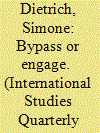| Srl | Item |
| 1 |
ID:
126516


|
|
|
|
|
| Publication |
2013.
|
| Summary/Abstract |
The conventional wisdom in the literature on aid allocation suggests that donors utilize bilateral aid as a tool to buy influence in the aid-receiving country. Those who conclude that aid is driven by donor self-interest focus on government-to-government aid transfers. However, this approach overlooks important variation in delivery tactics: Bilateral donors frequently provide aid to nonstate actors. This paper argues that donors resort to delivery tactics that increase the likelihood of aid achieving its intended outcome. In poorly governed recipient countries, donors bypass recipient governments and deliver more aid through nonstate actors, all else equal. In recipient countries with higher governance quality, donors engage the government and give more aid through the government-to-government channel. Using OLS and Probit regressions, I find empirical support for this argument. Understanding the determinants of donor delivery tactics has important implications for assessing aid effectiveness.
|
|
|
|
|
|
|
|
|
|
|
|
|
|
|
|
| 2 |
ID:
126583


|
|
|
|
|
| Publication |
2013.
|
| Summary/Abstract |
This article tests systematically the effect of political structures on the credibility of sovereign debtors in advanced economies. It argues that power-sharing and party system polarization have important effects on long-term interest rates. Where collective responsibility is high and polarization is low, the market perceives a more credible commitment on the part of sovereign debtors. These arguments derived from the theory of credible commitments perform much better than alternative accounts of the politics of sovereign debt, namely a market preference for right-wing governments and more flexible polities. The principal data consist of a panel of 23 rich countries between 1970 and 2009. There are tests for robustness to a wider sample and a variety of different measurements.
|
|
|
|
|
|
|
|
|
|
|
|
|
|
|
|
| 3 |
ID:
126471


|
|
|
|
|
| Publication |
2013.
|
| Summary/Abstract |
International relations scholars have previously argued that states facing budget constraints will join alliances to free resources for domestic spending. In this paper, we focus on the primary mechanism by which leaders have relaxed this constraint: sovereign borrowing. Sovereign debt enables states to maintain stable tax rates while increasing expenditures to confront budgetary emergencies. Affordable access to credit, then, serves as both a source of power and an important buffer between security and the political consequences of fiscal policy. States that lack the confidence of investors must make tough choices between continued security and their electoral fortunes. We suggest that as governments lack access to affordable credit, they will substitute military capacity with alliance formation. Alliances provide a means for leaders to offset the loss of flexibility from diminished access to credit without disturbing the domestic political economy. Using previous models of alliance formation as a guide, our empirical evidence indicates that states that have a hard time borrowing are more likely to form an alliance than those states with affordable access to credit markets.
|
|
|
|
|
|
|
|
|
|
|
|
|
|
|
|